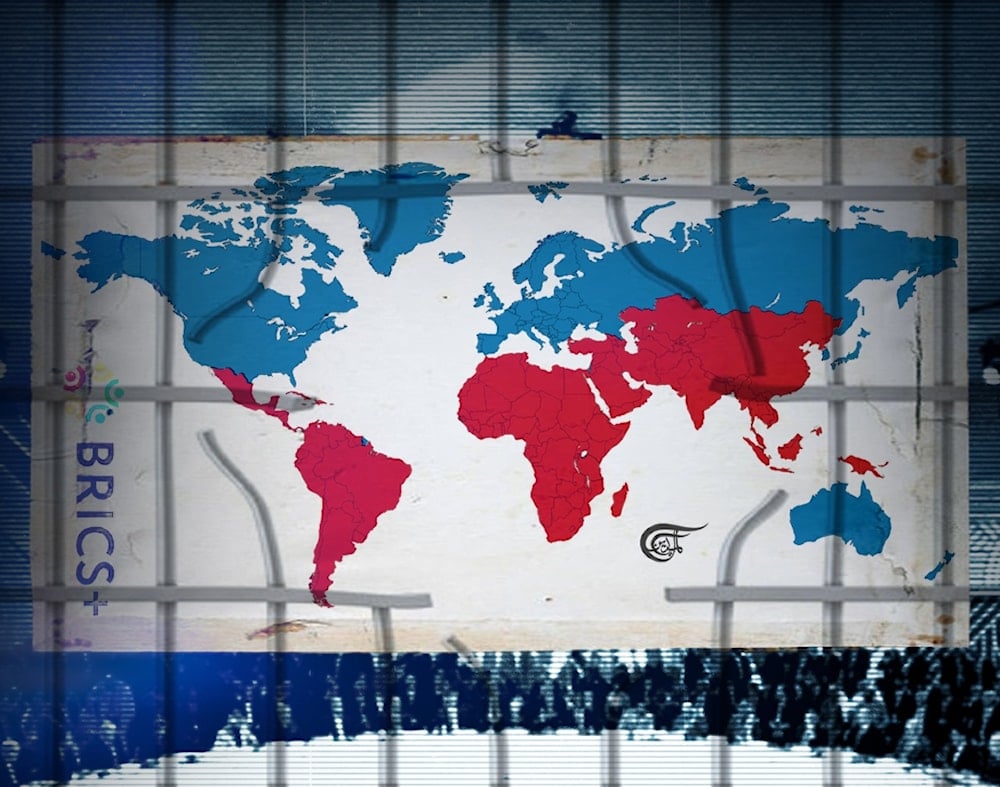BRICS+ remains credible counterweight to Western hegemony
It is irrefutable that on Palestine, sanctions fatigue in the developing world, and the weaponization of the dollar, BRICS+ has become a credible counterweight to Western economic hegemony.
-

BRICS+ remains credible counterweight to Western hegemony (Illustrated by Zeinab al-Hajj; Al Mayadeen English)
The acronym BRICS stands for the countries of Brazil, Russia, India, China, and South Africa, each of which is a founding member of an intergovernmental organization that prioritizes middle-income, emerging economies and economic cooperation. Founded in 2009, BRICS has now expanded to BRICS+ to include countries such as Iran, the United Arab Emirates, and Indonesia, adding high-income, emerging, and established economies in a framework geared at catering to the world’s largest markets in the absence of provocations and unilateralism.
The organization will be convening its newest summit in July 2025 in Rio De Janeiro, Brazil, with an agenda centering on enhancing political and socioeconomic cooperation, artificial intelligence governance, and promotion of multidimensional peace and security architectures, which are slated to benefit all at the expense of none.
Furthermore, evidence suggests that BRICS+ has established itself as a successful counterweight to American and Western hegemonic designs, which continue to damage multipolarity. This includes resilience in the face of brazen imposition of sanctions on countries such as Iran and Russia, the weaponization of the dollar to cripple regional economic giants such as China, and adoption of escalatory policies on regional conflicts such as "Israel’s" genocide in Gaza, Ukraine, and the latest conflagration between the Zionist entity and Iran. BRICS+ is also seeking realignment on Palestine, with member states calling for an end to Israeli barbarity while condemning attacks against member states such as Iran.
Global economic powerhouse
As western economies stagnate and face domestic pressures from immigration, inflation, to energy price shocks, countries in Asia, Latin America, and Africa are witnessing remarkable progress alongside generally better standards of living and the innate ability to become important financial players in the international system. This includes contributing to the overall health of the world economy. As of 2024, BRICS+ states encompassed 40% of international trade and 36% of global GDP in terms of purchasing power parity, which is higher than both the European Union and the G7 combined. Total oil production also stands at approximately 30% of total global output, with member states such as Iran having one of the largest proven oil reserves in the world.
Also, the monopoly of the West on agriculture is crippling and being replaced with self-sufficiency in the developing world including member states of BRICS+. BRICS+ produces 42% of the world’s wheat, 52% of the world’s rice, and 46% of soybeans, which, alongside trade and oil production, makes it self-sufficient in terms of crop yields and food security. To complement this potential, close to 60 bloc institutions have been established among member states, including the Contingent Reserve Arrangement. The CRA is a framework for providing liquidity and contingent instruments to member states dealing with balance of payment pressures and domestic financial instability, and there is also the New Development Bank, which supports public and private projects in member states with loans and investments. These constitute viable alternatives to Western-led financial institutions, which have only served to contribute to rising sovereign debt, limited domestic and localized development, and minimal impacts on poverty alleviation.
Eschewing dollarization while ensuring financial sovereignty, security
Another aspect of BRICS+ that challenges Western monetary architectures is the pursuit of financial independence by the bloc. Recall that President Lula Da Silva of Brazil, who replaced authoritarian, pro-"Israel" Jair Bolsonaro, who was also close to US President Donald Trump, questioned the bloc's dollarized transactions and emphasized opting for viable alternatives such as trading in local currencies, such as the Yuan and the Iranian Rial instead. What is encouraging is that Da Silva’s vision has materialized for the bloc in the form of bonds issued by the BRICS Bank in the South African Rand (an important currency in Africa). China, too, is successfully managing to increase its use of the Yuan in trading transactions, with close to 16% of its export revenue coming from the Renminbi.
Apolitical expansion and rising clout
Unlike Western economic hegemonic designs, which contributed to sovereign debt and declining credit ratings for the developing world, BRICS+ has expanded to include more dynamic members for peace and stability. This is exemplified in the bloc’s transcontinental appeal, where in the year 2023, new members Argentina, Egypt, Ethiopia, Iran, Saudi Arabia, and the United Arab Emirates agreed to partake in it, thus expanding its influence. This also reflects acceptance of diverse countries, governance systems, and ideologies, which is in line with China and Russia’s willingness to counter unipolarity promoted by the US while working toward a more equitable international system.
Post-Palestine realignments
Given that Washington D.C.’s unconditional support to a genocidal regime has continued unabated and left Palestinians increasingly disillusioned, the leadership in Gaza and the West Bank looks toward and expresses support for BRICS+ given the bloc’s proclivity toward a "two-state solution". The advocacy for Palestinian sovereignty in BRICS+ marks a sharp departure from the Trump administration’s repeated threats against Iran and unacceptable ceasefire proposals in the occupied Palestinian territories, while urging "Israel" to maintain the status quo. For Palestine, engaging with different countries in the bloc can help it diplomatically and economically, given that China and Russia have supported its internal reconciliation efforts, and leaders of the member states reiterated their support for an independent Palestinian state at the 2024 BRICS Summit in Kazan.
Also, a closer association with BRICS+ allows Palestine to benefit from conventional wisdom against Israeli barbarity from states such as South Africa, which lodged a case at the International Court of Justice against the Netanyahu regime.
It is hence irrefutable that on Palestine, sanctions fatigue in the developing world, and the weaponization of the dollar, BRICS+ as a bloc, an organization, and an entity has become a credible counterweight to Western economic hegemony.
A lot is expected at the July 2025 summit in Rio.

 Hamzah Rifaat
Hamzah Rifaat
 6 Min Read
6 Min Read











